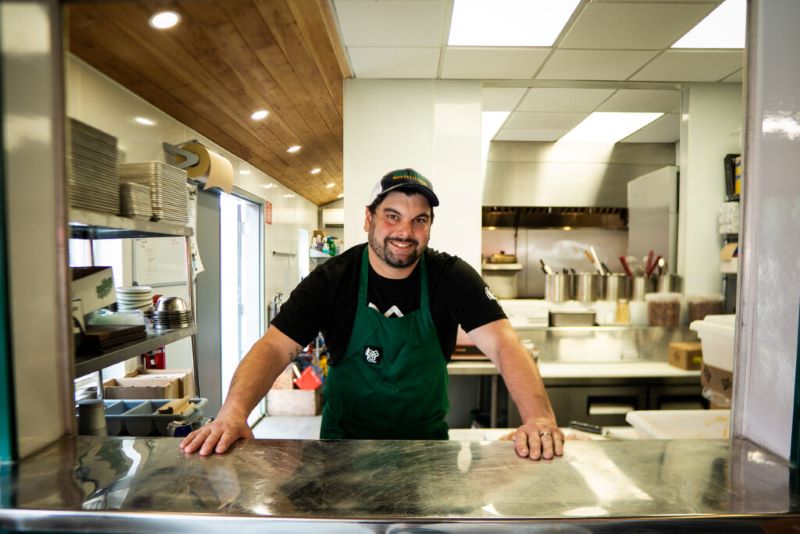Name: Joe Robbins
Location: Milo, Maine
Education/background: Professional restaurant experience for 10+ years
Business name: Executive Chef at Bissell Brothers Brewing Company
Tribal affiliation: Wabanaki

What led to your passion for indigenous foods?
I’ve looked up to and learned from some of the other chefs that you’ve interviewed for this series, such as Sean Sherman, Brian Yazzie and Nephi Craig. I’ve seen them flourish and do this thing that I always thought would be really cool, but never thought it was possible, only because the general public doesn’t know much about indigenous foods. Eating habits are such a big part of people’s daily habits and spending habits, so it’s challenging to ask someone to come out and spend money on a meal they may not even like or aren’t at all accustomed to. Bissell Brothers gave me the opportunity to include as many Indigenous dishes as I wanted on the menu. As we grow with more beer dinners and events, we will push indigenous foods even more to help get people accustomed to it.
I also want to re-educate. There is so much food we eat every day that we think are from Europe or Spain, and it’s really from this land and area. It’s unfortunate that not many people understand where their food comes from and the history. The big goal I have is to re-educate, more so than only getting people to eat the food. Some of the other chefs have bigger restaurants that are nationally known, and that will help get us in the right direction.
Why do you think it’s important to make traditional foods accessible for Natives?
I think it ties back to Indigenous languages. There is no English translation for a lot of foods and agricultural techniques of our ancestors. Years ago, every activity was based on survival and providing food for the family or tribe. It’s important to understand the movement of our ancestors and how that tells the story of ancestral foods. It’s a great place to start in understanding the cultural importance of the ingredients and dishes.
What is the importance of an indigenous diet for a healthy lifestyle?
Before colonialism, we didn’t have cavities and our sugars were natural. Natives are number one for diabetes, and it wasn’t always that way. That alone should tell you that if we returned to some of our Native ways, the health improvements and benefits could be tremendous.
What other ways (besides your business) are you involved in the education, restoration and accessibility of traditional Native foods?
I have cooked for a few pow wows, summits and symposiums, and things of that nature. Because of a recent article I was featured in, a few people have reached out to me who are doing a documentary on bison farming. We serve bison in our restaurants from Bigelow Fields, owned by Michael and Nichole Weaver. They are working with the National Bison Association on a documentary that will feature myself and their journey in becoming ranchers. It will show the importance of bringing those animals back to the land. In the past, they were the bovine creatures of America, and they could feed so many people.
Wabanaki studies is a requirement in most school systems in Maine, but many schools have been slow to adopt it. The city of Portland, Maine, has made it official to adopt those new requirements. Part of that project is a documentary on Wabanaki foods, traditions and the movement of our ancestors. I will be helping with the project and am excited to be part of the school curriculum development.
How can community members be involved and support the cause of restoring and protecting indigenous food systems?
Talk to your parents and grandparents to learn about traditions and foods. For example, in my family, there are a lot of basket makers and bead makers…hearing their stories is so valuable. Books can’t teach you the kind of information that you will get from your direct descendants. Look to your own backyard and your own family first and be willing to share knowledge.
* According to recent studies, Pacific Islanders and American Indians have the highest rates of diabetes among the 5 racial groups counted in the U.S. Census.
